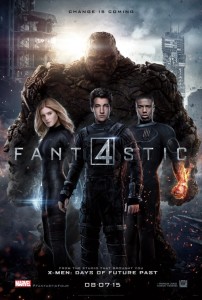Don’t let all the bad reviews and months of overwhelmingly negative buzz about Fantastic Four fool you: there are absolutely some praiseworthy elements to the film. There’s just not close to enough of any of them. Even setting aside the common fanboy complaint that this new take on the comic-book team is unnecessarily “dark and gritty,” there are undoubtedly flashes 
The studio scored casting coups across the board with the incredibly talented Miles Teller, Kate Mara, Jamie Bell, and Michael B. Jordan as the titular quartet. Teller portrays Reed Richards, a precocious young scientist who develops a revolutionary teleportation device with the assistance of his good-hearted tough-guy friend Ben Grimm (Bell). Reed next scores think-tank financial backing to develop his idea alongside scientists Sue Storm (Mara) and Victor Von Doom (Toby Kebbell), as well as Sue’s reckless brother Johnny (Jordan). Things go awry when Reed, Ben, Johnny, and Victor rush into an ill-fated early test of the equipment and are given superpowers by a mysterious cosmic energy on the other end of the teleporter, with Sue getting a hit of the effects as well.
With a last name like “Von Doom,” you can guess the path Victor ends up taking. But the other four wind up using their bizarre new abilities for good, and I’d love to see a movie where they actually get to play the titular super team. Unfortunately, Fantastic Four is not that movie. The four leads display a nice, bickery chemistry as a group, but only in the final moments of the film. We get a sense of some individual relationships among them – particularly Reed’s connection with Ben – but there’s no sense of them as a family, one of the concepts that makes the Fantastic Four property so appealing in the first place.
The team’s unique superpowers are another of the main appeals of the Fantastic Four, and the film even fails to deliver much of those. Reed has an elastic body, Sue can turn invisible and project force fields, Ben turns into a giant rock monster, and Johnny can burst into flames. It’s all fun stuff, seemingly made for swashbuckling big-screen adventure. But Fantastic Four spends half its running time building up to granting its characters those powers. It gives us a few nicely rendered initial glimpses of Reed and Ben adapting to their new abilities, and then bafflingly jump-cuts to a year later, when everyone has more or less mastered their powers. From there it’s more chatter and then off to confront Victor in a bizarrely brief,
On paper, director Josh Trank should also have been a benefit to this film. With his 2012 directorial debut, Chronicle, Trank offered a “dark” take on the superhero genre that nonetheless had some sense of fun and intelligence to it. Granted, Trank didn’t write that film or this one, although he most likely got more creative control over Chronicle than he did on Fantastic Four. He recently pulled out of an upcoming Star Wars film, citing a desire to work on smaller projects after his negative experience on Fantastic Four. It’s hard to say if Trank’s vigor really got steamrolled by the studio or if Chronicle was just a fluke in the first place. It’ll be interesting to judge Trank more fairly on his next project, which surely won’t be a Fantastic Four sequel. But with a nonstarter as big as this one, a sequel probably wasn’t going to happen in the first place.
Patrick Dunn
Latest posts by Patrick Dunn (see all)
- Interview with Alex Garland, writer/director of Ex Machina - April 24, 2015